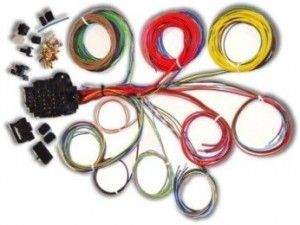Auto Wiring Services
Air Filter Maintenance
The electrical system in your car, truck, SUV or minivan is responsible for providing power to a variety of components. And like any system, electrical and wiring problems can be problematic if not diagnosed and repaired properly. Unfortunately, auto wiring problems are a mystery to many owners, shade tree mechanics, and even some seasoned technicians.
One reason that diagnosing electrical problems is frustrating is that we can’t see or touch electricity like we can with other components on a vehicle. We can see its effects, or the lack thereof, when a component fails. But identifying and diagnosing the cause can be a time-consuming and elusive process if you don’t know what to look for or where to begin – especially on late models cars that are very dependent on advanced electronics.
Safety is always an important consideration when working on automotive electrical systems. The high voltage side of the ignition system, as well as the high voltage battery and circuits in hybrid vehicles, needs to be respected. Which is why the danger of accidentally shorting out a hot circuit and damaging the wiring, PCM or other onboard electronics, or starting a fire is very real.

So, what are some common symptoms of electrical problems?
Problems with a car’s electrical system can oftentimes manifest themselves as equipment malfunctions, blown fuses, burning smells or unusual battery drain. Symptoms of electrical problems in one system can also be caused by seemingly unrelated issues in another. For example, a blown fuse can cause electrical equipment connected to that fuse to cease functioning until it is replaced, but the blown fuse itself may be symptomatic of a short circuit in the car’s wiring. This is why understanding how electricity works in a vehicle is important.
Here is a very basic overview of how an automotive electrical system works:
- Every circuit needs a power source — electrical devices usually require a minimum voltage to function properly and all circuits require continuity. Consequently, most electrical problems are caused by low voltage (or no voltage), excessive resistance or a loss of continuity.
- The wiring routes information that is needed to run theses complex components. Wires connect the different components and a broken or loose wiring can’t properly transfer the electric current and signals.
- Electricity is the flow of electrons within a conductor. We control how and where these electrons move, such as starting the engine, charging a phone, controlling the climate control system, etc., through the use of conductors and resistors. Conductors are materials that allow electrons to flow freely and resistors are materials that inhibit electron flow. We use resistors to insulate our conductors to keep the electricity flowing where we want it to go. (There are also semiconductors like transistors and diodes, to name a few, but we don’t need to get too involved here.)
- While there are exceptions, electricity generally flows from positive to negative. Also, electricity always runs in a circle, and the ground side is just as important as the hot side.
- Another big component of an electrical circuit is the load. The load is what does the work. The load can be a window regulator motor, a heating element, a light bulb, or any number of other electrical components. The load and the resistance in the circuit dictates the amount of current flow in the circuit. Circuits are controlled by switches.
What are the different varieties of wiring faults?
Generally speaking, there are three types of typical wiring faults found in automobiles.
- An open circuit condition occurs when the wiring is broken or disconnected from the electrical system, though many failures of this type involve bad connectors or circuit boards as well.
- A short circuit involves an undesired electrical connection in the system that can cause wires to melt or fuses to blow, which can result in a subsequent open circuit fault if a wire burns completely through.
- Finally, ground faults are similar to short circuits but generally do not cause the same level of damage as the electrical energy flowing through the wire is dissipated by the grounding object. Tracking down wiring problems involves a methodical process of elimination.
Our expert technicians at COHO Auto are able to diagnose any auto wiring issues in your vehicle. More importantly they are trained and equipped to repair any problem with the electrical system of your car from repairing damaged wiring to replacing an entire wiring harnesses.
If you suspect that your vehicle is having problems with its electrical and wiring system, please do not hesitate to get in contact with us. It is better to get the problem diagnosed and fixed than to wait for more serious symptoms to manifest.
